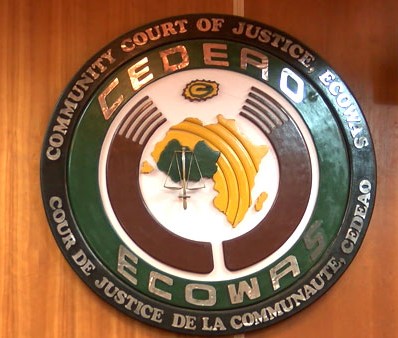The ECOWAS Court of Justice has ruled as inadmissible, three of the four grounds of a suit filed by the son of a deceased Ghanaian seeking to hold the country liable, for among other things, failure to investigate the disappearance of his father, one of the 50 West Africans killed by a Gambian para-military unit during the Jammeh reign in The Gambia in 2005.
The 50 migrants, mainly from the Republic of Ghana and the Federal Republic of Nigeria, were in transit in the country when they were reportedly arrested and later executed by the paramilitary unit.
In dismissing the grounds, the Court agreed with the Government of Ghana that the human rights violations complained by the applicant, Isaac Mensah, son of the deceased Peter Mensah, were “committed outside the jurisdiction of Ghana, but in the Republic of the Gambia at a time when the Ghanaian government had neither knowledge nor access to intervene in the matter.”
The Respondent had also told the Court that it made various diplomatic efforts, including the institution of the 2009 UN/ECOWAS investigation, to resolve the matter and is committed to further investigations in light of new information that has been uncovered.
In the judgment delivered by Justice Edward Amoako Asante, presiding Judge, the Court concluded that it lacked jurisdiction over the “Applicants’ claims related to (i) the alleged violation by the Respondent of the prohibition against enforced disappearance due to its failure to investigate the detention and enforced disappearance of Mr. Peter Mensah; (ii) the alleged violation of the Applicants’ right to an effective remedy, contrary to Articles 1, 4, 5, 6, and 7 of the African Charter and Articles 6(1), 7, 9, and 16 of the ICCPR; and (iii) the alleged violation by the Respondent of the right to truth, contrary to Articles 2(3) and 7 of the ICCPR.
“This is because all these claims are directly linked to or based on the alleged arrest, detention, and disappearance of Mr. Peter Mensah in The Gambia, rather than in the Respondent State.
On the other hand, the Court held that it has jurisdiction over the Applicants’ claim relating to the Respondent’s violation of the right to information under Article 9(4) of the Court’s Protocol. Applicants allege that Respondent has failed or refused to provide the First Applicant information including a copy of the 2009 UN/ECOWAS report delivered to Ghana, the pathologist’s report on the bodies returned to Ghana in 2009, and a report on the disbursement of the money paid by The Gambia to the families.
The Court therefore directed the Applicant to provide information to the son of the deceased Ghanaian, mainly the 2009 UN/ECOWAS committee report delivered to Ghana; the coroner’s /pathologist report on the bodies returned to Ghana in 2009; a report of the disbursement of the money paid by The Gambia to the families and a copy of the videotape of the burial ceremonies of the six bodies returned to the country.
The Court held that by denying the son access to these documents, the Republic of Ghana breached the Applicant’s right to information under Article 9(1) of the African Charter and Article 19(2) of the International Covenant on Civil and Political Rights (ICCPR).
The Court also struck out the second Applicant in the suit, a Gambian-based human rights NGO, the Registered Trustees of African Network Against Extrajudicial Killings and Enforced Disappearances (ANKED), on the grounds that the first applicant, which it claimed to represent, is already representing himself. Secondly, ANKED cannot be deemed to be suing in a public interest as the case does not bear the hallmark of a public interest suit.
The Court also struck out the names of the other 23 Applicants contained in the initiation application. It held that “contrary to its longstanding jurisprudence, the First Applicant has not shown evidence that he has the authority to represent the 23 other persons on whose behalf he brought the action.
“Therefore, those individuals are struck off from the suit, and the First Applicant is deemed to be suing for himself only,” the Court added.
The Court also added that “other reliefs sought by the parties which have not been herein granted in whole or in part are hereby dismissed and decided that the parties bear their own costs.”
Also on the panel of the three judges for the suit were Justices Gberi be Ouattara and Ricardo Claudio Monteiro Goncalves.
Latest Stories
-
Alan Kyerematen saddened by NDC and NPP’s neglect of Krofrom Market in the Ashanti Region
1 min -
CSIR Executive Director urges farmers to adopt technology for improved farming
15 mins -
Football Impact Africa’s Ghetto Love Initiative inspires change in Teshie
26 mins -
Peter Toobu calls for tighter border security over uncovered weapons at Tema Port
28 mins -
Gov’t has failed its commitment to IPPs – Ablakwa
32 mins -
Sell Chrome to end search monopoly, Google told
44 mins -
KATH to install seven new dialysis machines by end of November
47 mins -
Walewale: Police confiscate 37 bags of cocoa beans suspected of being smuggled out of Ghana
58 mins -
‘Expired’ Rice Scandal: FDA confirms rice was safe for consumption after rigorous lab tests
1 hour -
Many women have experienced intimate partner violence – Angela Dwamena Aboagye
1 hour -
Power challenges persist due to government’s mismanagement of revenues – Okudzeto Ablakwa
2 hours -
Jordan Ayew injury not as bad as feared – Leicester City boss
2 hours -
Stonebwoy heads to North America for UP & RUNNIN6 tour
2 hours -
FDA explains extension of best-before date for ‘expired’ rice
2 hours -
Rebecca Akufo-Addo, Mahama storm Akuapem North as NPP NDC slugs it out
2 hours

